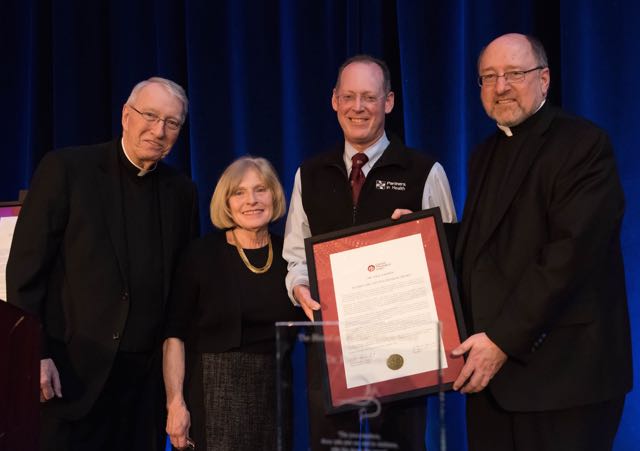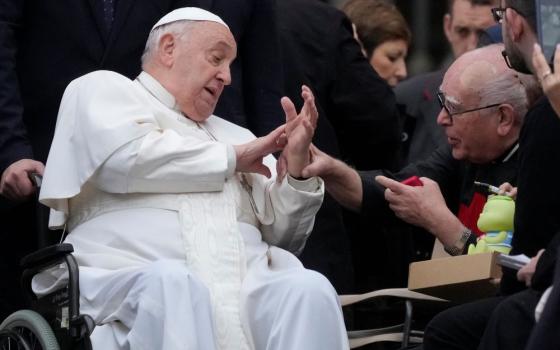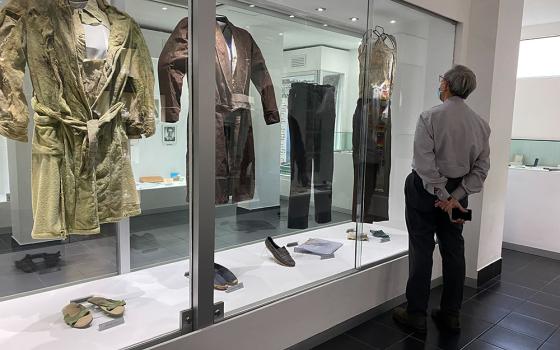
Rev. Kurt F. Hartrich, O.F.M., chair of the CTU Board of Trustees; Carole Segal, CTU supporter and award presenter; Dr. Paul Farmer; Rev. Mark R. Francis, C.S.V., president of CTU (Photos by Mark Campbell)
Just like the pebble dropped on the proverbial pond, the effects of the Second Vatican Council ripple outward and down through generations 50 years later.
A rich example could be seen here Wednesday, when 460 supporters and friends of the Catholic Theological Union gathered for its annual Trustee Dinner.
CTU was founded in 1968 when three religious orders -- Franciscans, Passionists, and Servites -- inspired by the council's spirit of aggiornamento (renewal) decided to close their individual seminaries and join together as one. They would share resources -- libraries, professors, staff, and finances -- in a new model of collaboration. Furthermore, their seminarians would move out of rural isolation and into an urban neighborhood, Hyde Park, near the University of Chicago.
To ensure the council's spirit of ecumenism, CTU would become neighbor to Chicago's Protestant seminaries. This was revolutionary. This was the church adopting to the modern world, just as the council documents called for.
Soon, CTU was enrolling women religious and the laity. This, too, was unprecedented. Classes stressed a theology of involvement. Theologians were leaving their academic ivory towers for the streets of Chicago, where the people, including the poor, struggled to raise families and find meaningful lives.
Vatican II ushered in the idea of a global church, one that respected non-Western cultures and saw communities of believers as primarily local. These communities were to interact with and become the leaven for this widely new and inclusive church. Similarly, CTU opened its doors to international students, and soon they were coming from all over the world. Today, 40 percent of CTU students come from outside the U.S. It boasts 4,000 graduates working in 60 countries.
I had the opportunity to attend the Trustee Dinner, a school fundraiser, held in the downtown Hilton on South Michigan Avenue. Soon, I was elbow-to-elbow with CTU faculty who have given decades of their lives to education and living out the CTU mission. They have embodied Vatican II's justice call. To mention a few of the longtimers: Sister of St. Agnes Dianne Bergant, professor emerita of Old Testament studies; Servite Fr. John Pawlikowski, professor of social ethics and director of CTU's Catholic-Jewish Studies Program; and Passionist Fr. Donald Senior, former CTU president who was recently named chancellor. Each has embodied Vatican II ideas, whether it has been teaching Scripture or changing the way we approach other religions, throughout his or her professional life, shaping the minds of students over generations.
As it does each year, the program called for the honoring of individuals who exemplify CTU values of peace, justice, reconciliation and service. This year was no exception: CTU honored physician and anthropologist Paul Farmer with its Blessed are the Peacemakers Award and Robert and Sheila Berner and their children with its Diakonia Award for exemplary service.
The council and forces it unleashed, it turns out, shaped the lives of these awardees.
Farmer, chairman of the Department of Global Health and Social Medicine at Harvard Medical School, has written extensively on issues of health, human rights and the medical effects of social inequality.
"The idea that some lives matter less is the root of all that's wrong with the world," he said.
In 1987, he co-founded Partners In Health (PIH) to deliver health care to the residents of Haiti's mountainous Central Plateau region. In 1993, he was awarded a "genius grant" from the MacArthur Foundation and used the money to establish the Institute for Health and Social Justice, PIH's research and advocacy arm.
In 2002, the PIH project in Haiti became one of the first to receive funding from the Global Fund to fight AIDS, tuberculosis and malaria. PIH now provides health care in some of the poorest regions of Africa, in more than a half dozen countries. It sees health care as a basic human right and claims its own unique "preferential option for the poor" using liberation theology first articulated in 1968, just after the council, by the Latin American bishops in Medellin, Colombia.
Farmer graduated from Duke University and later from Harvard Medical School. Between gaining those degrees, he went to Haiti, where he began to find footing among the poor. His Haitian radicalization experience, he told me, came after being encouraged to take the step by women religious radicalized by Vatican II. It was deepened, he said, by reading NCR's ongoing, in-depth Haitian coverage at the time. NCR, of course, was a council product, founded in 1964 by lay journalists who believed in independent journalism and the right of readers to unfettered news about their church.
Farmer said two men had a particularly formative influences on him: Salvadoran Archbishop Oscar Romero, who was killed in 1980, and the founder of liberation theology, Fr. Gustavo Gutierrez. Farmer recently published In the Company of the Poor: Conversations with Dr. Paul Farmer and Fr. Gustavo Gutierrez, in which he credits liberation theology for setting is own medical framework.
Before Farmer spoke to the CTU gathering, Robert Berner addressed the group. A Notre Dame and Harvard Law School graduate, Berner is as accomplished as he is self-deprecating. He is a pedigree attorney who has never met a progressive cause or marginalized person he didn't personally take under his wing. His two feet are planted solidly in love for family and love for his church, and this has given him a solid Chicago platform to serve, teach and lead. He is a CTU life trustee and a member of its Bernardin Center advisory board. Founded in 1997, the center fosters reconciliation, peacemaking, and leadership development. He is former president of LINK Unlimited, which opens educational doors to African-American students, and of the Catholic Interracial Council, as well as former member and chair of the Legal Aid Society. The list goes on.
As he accepted the award on behalf of his family, at first he told the audience he didn't understand why CTU had chosen him for the honor. Then, looking proudly at his wife and children, he said he "got it." His children, John Berner, Mary Berner, Robert Berner III,; Louise Berner-Holmberg, and Sheila Berner Kennedy, are living out the values their parents taught them. The award notes that "each has made significant contributions through their philanthropy and volunteer work, seeking to uplift communities and organizations which endeavor to serve the common good."
Vatican II, then, was not simply an event in history. It was and is a new way of being church. This radically new way of being a service and healing church, now enhanced in the Francis pontificate, is gaining momentum over time, shaping lives doggedly committed to justice and mercy only vaguely imagined at the council five decades ago.
[Thomas C. Fox is NCR publisher. His email address is tfox@ncronline.org. Follow him on Twitter: @NCRTomFox.]



